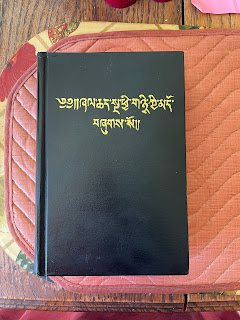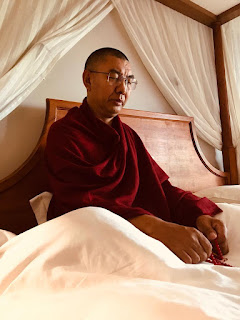Firstly, from an etymological point of view, I am quite curious to know the origin of the English word ‘retreat’ and why it is used in this context. In the Tibetan language, we call retreat ‘ri khrod’ or ‘tsam’. The first morpheme, ri means mountain. The second word, khrod, means side. Therefore ri khrod means the mountainside. Actually, ri khrod pa are people who live in the mountain valleys, or mountain people. For example, those who inhabit the Big Sur can be referred to as ri krhod pa, or mountain people, because they live on the sides of the mountains, but it does not mean that they are on retreat.
When most people want to speak about a retreat such as the one I went on, in Tibetan, we use the word tsam. Tsam in Tibetan means to separate, understood to mean separate oneself from samsaric activities. For example, we would say, “the Lama went on the tsam”. When referring to retreat, or tsam, Lamas will say body tsam, speech of tsam, and mind of tsam. These three – body, speech, and mind – on retreat. If you go on a body tsam, you must inhabit an isolated place such as a mountain where you can avoid others and practice in solitude. In body tsam, the practitioner’s body is separated from samsara; when making an offering to a monk on body tsam, one cannot see the monk in-person and must knock and leave the offering outside the retreat. When I was on my three year, three month, three day retreat, when someone would make an offering to me, such as food or flowers, they would knock, and I would slightly open the entrance and they would only see my hand. This is a retreat of the body. Speech tsam is a silent retreat, refraining from talking at all times and restricting the tongue. Also on the three year, three month, three day retreat in my tradition, we would write a short note to each other if we needed something such as a dorje, text, etc., when on a speech tsam. Lastly, mind tsam involves looking at the nature of your own mind and also at the same time eschewing negative thoughts and thinking. As my Guru, Sangye Tenzin Rinpoche, always used to say to me, “Catch your mind with you all the time; don’t wander.”
So, why go on retreat? Most of us never take care of our mind. Actually, the majority of us never take care of our speech either; we just chatter away continuously and indiscriminately, saying anything that comes to mind. Sometimes, I feel we engage in too much talking. Even when we are trying to help another person, we sometimes think to ourselves, I am going to help this person by saying something to him or her, but sometimes people have a different idea. Maybe you say something that you believe is helpful, but the speech actually hurts the person further. In Tibetan we have a saying that means something along the lines of, when someone says he or she hurt me, it is usually not a physical beating but rather pain coming from words. Most pain that we inflict or pain we experience is from negative speech; people sometimes misunderstand what is said or simply do not want to hear such things. That is why it is sometimes best to engage in a retreat of silence and to restrain one’s tongue. As Shantideva said in A Guide to the Bodhisattva’s Way:
“When talking I should speak from my heart and on what is relevant.
Making the meaning clear and the speech pleasing.
I should not speak out of desire or hatred
But in gentle tones and in moderation.”
Therefore speak less and talk gently. It is also advised to always check before you speak, check what you will say, and ask yourself, will these words be good for this person? As I wrote in the 10th verse of ‘Heartfelt Advice Of Dharma Nectar’:
“When among many, watch your speech,
When staying alone, watch your mind, it is taught.
In all actions, again and again,
Check your body, speech, and mind. That is my heart advice.”
These three things – body, speech, and mind – are very important to consider on retreat.
Every year I go on retreat, but this year in particular, it was especially important because I felt that throughout the pandemic, I have been talking too much. By talking too much, I mean time spent talking via technology. Not being back to in-person teaching in the center, most of the teachings and prayers are held on Zoom and Facebook Live. Sometimes, after the teaching, I say to myself, today, even though this is actually Dharma, still I feel that I talked too much. Moreover, with the pandemic, so many people have suffering and various problems, and my students and friends know that I am alone at the Dharma Center, so many people reach out to me on the phone, video chat, etc. for various reasons. I am very happy to do this as it is my responsibility, but I am more busy now in this respect than before. In Tibetan and Chinese culture, people have great faith in Buddha Amitabha and the Amitabha Pureland, and when friends or relatives pass away, they request Amitabha prayers and phowa. Actually, as I have said many times, technology is really a great blessing and a great opportunity; without this pandemic, many people would not know I am here. The computer has really become a virtual Dharma Center, and in addition to center activities, I have come together with many Lamas and monks for discussion and teachings on the Dharma.
This past retreat was a full retreat in that my body stayed within the Dharma Center with the exception of exercise everyday walking to the beach to combat diabetes. Also, I focused on catching my mind all the time as much as I could. And lastly, maintaining silence was very important this time by refraining from social media or talking to anyone.
A few times while I was on retreat, during my daily walk to the beach, I ran into a few of my local students who greeted me by saying “Hello Rinpoche” or “Tashi Delek”. I signaled gently that I could not talk. I realized some students did not know, and later they received the weekly newsletter or checked my websites. Afterwards, when they saw me, they smiled and said I understand, I got the news that you’re on silent retreat.
I have one slightly humorous story. Walking in my neighborhood, my neighbor and I are quite friendly and we always greet each other with a hello, good morning, good evening, etc. This month, when my neighbor saluted me, I did not verbally respond; I just folded my hands to show acknowledgement of their greeting and like a prostration bowed to them. Then after the end of my retreat, my neighbor asked me, Rinpoche , are you OK? I told them, yes I am fine, last month I was on a silent retreat and that is why I did not respond verbally to you. They immediately understood. My neighbor told me that he mentioned to his family that Khenpo seems different this month, so we had a laugh together.
I just wanted to let everyone know that I experienced great happiness throughout the retreat. I recited mantras, prayed, engaged in other Dharma activities and practices. With my body, I stayed inside the Dharma Center, meditated, and went to the beach. Most of my speech was Dharma-related, and did not engage in chatter, and I focused on catching my mind throughout the month. My body, speech, and mind were used on retreat.
Why am I outlining these aspects of retreat? Because for beginners, doing all three – body, speech, and mind – at the same time is very difficult. That being said, sometimes my Guru would tell us monks that using all three at the same time on retreat is too much for you. You can first try a retreat of the body, vowing to go on a one week solitary retreat in which you do not see or interact with anyone, focusing mostly on the body. Also, you can go on a silent retreat while refraining from speech, or go on a retreat of the mind in which you catch the monkey mind.
Regardless, we must take care of these three. Normally of course, most people take care of their body very well. We make sure that they’re eating enough healthy foods, taking vitamins, exercising, beautifying the body with clothing and makeup, etc. But how much do we pay attention to our speech or our mind? We must think of these too; we need balance. However much you take care of your body, you must take care of your mind as well. As I wrote in the 17th verse of the Doha a ‘Dharma Gong to Wake us from Ignorance’:
Good fragrance clothing the mind
can be taken to the next life.
Perfume anointing the body
benefits nothing; it just costs a lot!
and also in the 24th verse:
If we take care of our mind
like we take care of our body,
we will not much longer have to experience
mental difficulties like we do now.
I, Khenpo Karten Rinpoche, dictated this recount following the conclusion of my one-month solitary retreat in November of 2021. This blog was transcribed by my student, Karma Choeying, through a series of audio recorded messages and conversations.















